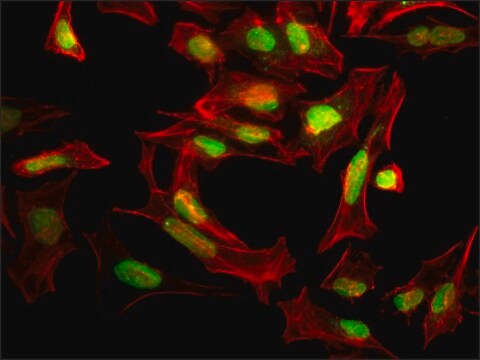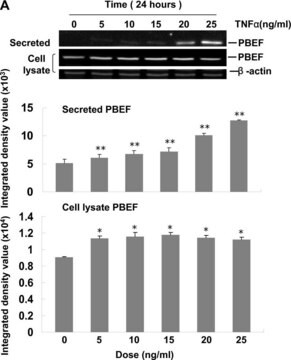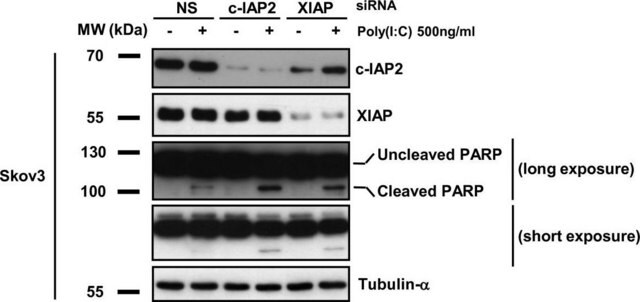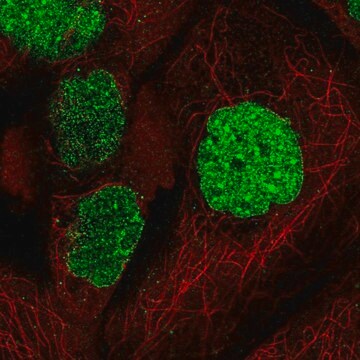Recommended Products
biological source
rabbit
Quality Level
antibody form
purified antibody
antibody product type
primary antibodies
clone
polyclonal
species reactivity (predicted by homology)
all
manufacturer/tradename
Upstate®
technique(s)
western blot: suitable
isotype
IgG
NCBI accession no.
UniProt accession no.
shipped in
dry ice
target post-translational modification
unmodified
Gene Information
human ... SENP2(59343) , SUMO1(7341)
General description
The small ubiquitin-related modifier SUMO-1 belongs to the growing family of ubiquitin-related proteins involved in post translational protein modification1. It is present in all eukaryotic kingdoms and is highly conserved from yeast to humans. SUMO-1 does not appear to target proteins for degradation but seems to be involved in the modulation of protein-protein interactions. An increasing number of SUMO-1 substrates are being described but three major substrates for SUMO-1 modification are RanGAP1 and PML proteins.
Specificity
Recognizes SUMO-1. This antibody shows no cross-reactivity with ubiquitin, multi-ubiquitin chains, SUMO2/3, UCRP, Nedd8, and FAT10.
Immunogen
Synthetic peptide corresponding to amino acid residues 11-101 of human SUMO-1.
Application
Anti-SUMO-1 Antibody detects level of SUMO-1 & has been published & validated for use in WB.
Linkage
Replaces: 04-453
Physical form
100 µL of purified by salt precipitation in PBS containing 0.01% sodium azide. Dilute to working strength with 50mM Tris-HCl buffer (pH 7.6) containing 1.5% sodium chloride and 1% normal goat serum (if a goat anti-rabbit IgG linker antibody is to be used).
Format: Purified
Legal Information
UPSTATE is a registered trademark of Merck KGaA, Darmstadt, Germany
Not finding the right product?
Try our Product Selector Tool.
Storage Class
10 - Combustible liquids
wgk_germany
WGK 2
flash_point_f
Not applicable
flash_point_c
Not applicable
Certificates of Analysis (COA)
Search for Certificates of Analysis (COA) by entering the products Lot/Batch Number. Lot and Batch Numbers can be found on a product’s label following the words ‘Lot’ or ‘Batch’.
Already Own This Product?
Find documentation for the products that you have recently purchased in the Document Library.
C Kretz-Remy et al.
Biochemistry and cell biology = Biochimie et biologie cellulaire, 77(4), 299-309 (1999-11-05)
Regulation of protein functions can be achieved by posttranslational protein modifications. One of the most studied modifications has been conjugation to ubiquitin, which mainly targets substrate proteins for degradation by the 26 S proteasome. Recently, SUMO/sentrin, a ubiquitin-like protein has
P Bayer et al.
Journal of molecular biology, 280(2), 275-286 (1998-07-09)
The recently discovered small ubiquitin-related modifier SUMO-1 belongs to the growing family of ubiquitin-related proteins involved in postranslational protein modification. Unlike ubiquitin, SUMO-1 does not appear to target proteins for degradation but seems to be involved in the modulation of
Lorna Moll et al.
eLife, 7 (2018-11-08)
Although aging-regulating pathways were discovered a few decades ago, it is not entirely clear how their activities are orchestrated, to govern lifespan and proteostasis at the organismal level. Here, we utilized the nematode Caenorhabditis elegans to examine whether the alteration
S Müller et al.
Nature reviews. Molecular cell biology, 2(3), 202-210 (2001-03-27)
Covalent modification of cellular proteins by the ubiquitin-like modifier SUMO regulates various cellular processes, such as nuclear transport, signal transduction, stress response and cell-cycle progression. But, in contrast to ubiquitylation, sumoylation does not tag proteins for degradation, but seems to
Our team of scientists has experience in all areas of research including Life Science, Material Science, Chemical Synthesis, Chromatography, Analytical and many others.
Contact Technical Service








